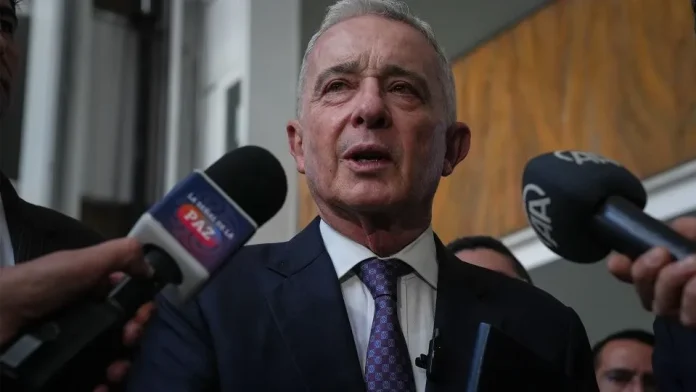Former Colombian President Álvaro Uribe received a 12-year sentence of house arrest for witness tampering and bribery. This landmark ruling has shocked Colombia and seriously affected Uribe’s reputation as a conservative leader.
Details of the case and legal proceedings
The trial lasted nearly six months. Prosecutors accused Uribe of trying to influence witnesses who linked him to paramilitary groups in the 1990s. Now 73, Uribe denied any wrongdoing and called the case “political persecution.” He announced plans to appeal his conviction earlier this week.
Uribe’s defence asked the court to let him stay free during the appeal. However, Judge Sandra Heredia rejected the request, warning that Uribe might “easily” flee the country. Besides house arrest, the court banned him from holding public office for eight years and fined him about $776,000.
Before the sentencing, Uribe shared on social media that he was preparing his appeal arguments. He encouraged others to “think much more about the solution than the problem” in times of crisis. The appeals court will decide by early October. Either side may then take the case to Colombia’s Supreme Court.
Legacy and public reaction
Uribe served as president from 2002 to 2010. During his term, he maintained strong ties with the United States and won both avid supporters and fierce critics in Colombia. Many praise him for restoring order and pushing paramilitary and rebel groups towards disarmament. Others blame him for human rights abuses connected to right-wing paramilitary groups.
Judge Heredia found clear evidence that Uribe and a lawyer attempted to persuade three jailed former paramilitaries to withdraw their testimony. This testimony had supported an investigation by left-wing senator Ivan Cepeda into Uribe’s alleged paramilitary ties. The saga began in 2012 when Uribe sued Cepeda for libel. In 2018, Colombia’s Supreme Court dismissed that suit and launched an investigation against Uribe instead.
The verdict divided the nation deeply. Martha Peñuela Rosales, an Uribe supporter in Bogotá, wept and prayed, calling the sentence “unjust” and insisting Uribe deserves freedom. Meanwhile, Sergio Andrés Parra, who protested outside the courthouse, said the 12-year sentence “is enough” and believes “history has already condemned him,” regardless of the appeals.
Uribe’s presidency achieved major military victories against leftist rebels. His efforts paved the way for peace talks that led to the disarmament of over 13,000 members of the Revolutionary Armed Forces of Colombia in 2016. Yet, his legacy will now also include this unprecedented conviction and ongoing legal struggle.
